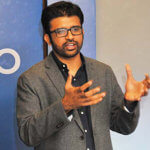At the turn of this century, health outcomes in India and the quality of underlying health system notably lagged those of peer nations. From such a delicate starting position, the progress made in the last decade is mixed. The government (private sector) has recognized the need for reform and introduced several in the Eleventh and Twelfth Five-year Plan. The public sector has played a key role in improving access and quality during this timeframe. Here are the success stories of 2 digital health startup founders in India and their typical profiles.

Image Courtesy of yourstory.com
India discovers it is lagging behind peers on health care issues. India is still facing the age-old problems such as malnutrition, sanitation and access to affordable hospital services and clinical care. Healthcare workforce & infrastructure remains poor in India. More than half of existing workforce don’t’ have practical experience in actual healthcare structure. Infrastructure gaps remain extensive & lack assistance to rural areas. There exists a major challenge to satisfy needs of patients with current models of healthcare.
Startup founders can help bring leading ideas, innovations and experiences to the healthcare sector. Through their innovations, they can better identify solutions for every problem. Digital Healthcare start-ups will help patient experience as well as generate employment. [1]
So more and more IIT & IIM graduates, IT professionals, and young innovators trying to capture the momentum with support from the government & private players.

Image Courtesy of /techstory.in
A typical Indian entrepreneur is one who has an IIT or IIM graduate with a couple of years of experience in the IT or technical sector. [2] The average work experience of the Indian startup founder who has raised $2 Million is around 8-10 years. Some are highly educated; others are high school /college dropouts. Some are inheritors, and others are self-made.
Digital healthcare founders in India varies from tech graduates to engineering graduates, from IT professionals to management expert from tech giants like Microsoft, Google, etc. Most of these founders have different aspirations and targets, but there is a common goal to entrench the brand in healthcare across the country.
| Recommended for you | |
| Digital health India: A guide to startups, finance, markets | |
| 26 Key people in digital health India and their profiles | |
| 300 CEOs of innovative digital health startups in India |
In 2008, Shashank ND’s father was advised to undergo a knee surgery. After taking local consultation, he turned to a specialist in the US for a second opinion. Unfortunately, his father’s medical reports could not be shared with the doctor since they were not obtainable in a digital layout. [3] It got Shashank, a biotechnology graduate thinking about the advantage of digitizing health records. In his final year, he and his classmate founded a startup called Practo Ray along with his classmate in a bid to software to simplify healthcare. This online management software allows doctors to keep all records of patients in digital format. They are working in B2B as well as B2C segments, and their focus is in India in an attempt to improve the situation of the disorganized and limited healthcare industry.
Shashank had a modest middle-class background and completed his studies from National Public School in Bangalore. He then finished graduation in engineering from NIIT, Karnataka. He & his partner were confident about their product and believed it is best in the market. They are of the opinion that, “if the product doesn’t sell itself then what’s the point.”
Some of the founders are held various management positions in giants like Facebook and Snapdeal and wanted to close the gap between doctors and patients. This deficiency is more aggravated outside metros where accessibility of physicians is itself a challenge.
Lybrate, another start-up developed recently. It was established to connect a network of physicians with patients via a mobile app or online communication from anywhere, anytime. [4] The platform also offers patients to have the privacy they want. It is especially helpful when they need to consult on the subjects of psychology, sexual health etc.
Other founders are from top universities in US or India, Management graduates or employees of different companies like Google or Apple. The most common thing about every entrepreneur and startups is that they are trying to make most of the mobile technology, digitization and enable better facilities to end user. Budding startups focus on customers are at the centre of decision-making.
Most of the entrepreneurs find it difficult to convey their parents during early stage and required lots of patients. And this is the story of most of the Indian startup founders and a lesson for new players entering the market. The process is slow and tedious; you will have to be patient to get desired results over the period.
Even today, a majority of the workforce has second thoughts about joining the start-ups. According to reports, founders from small towns appear to put in more hard work to make their start-ups prosper & succeed. There are numerous opportunities available for private players and other professionals to invest in India’s healthcare sector which needs proper mentorship.
Image credit: www.istockphoto.com

















